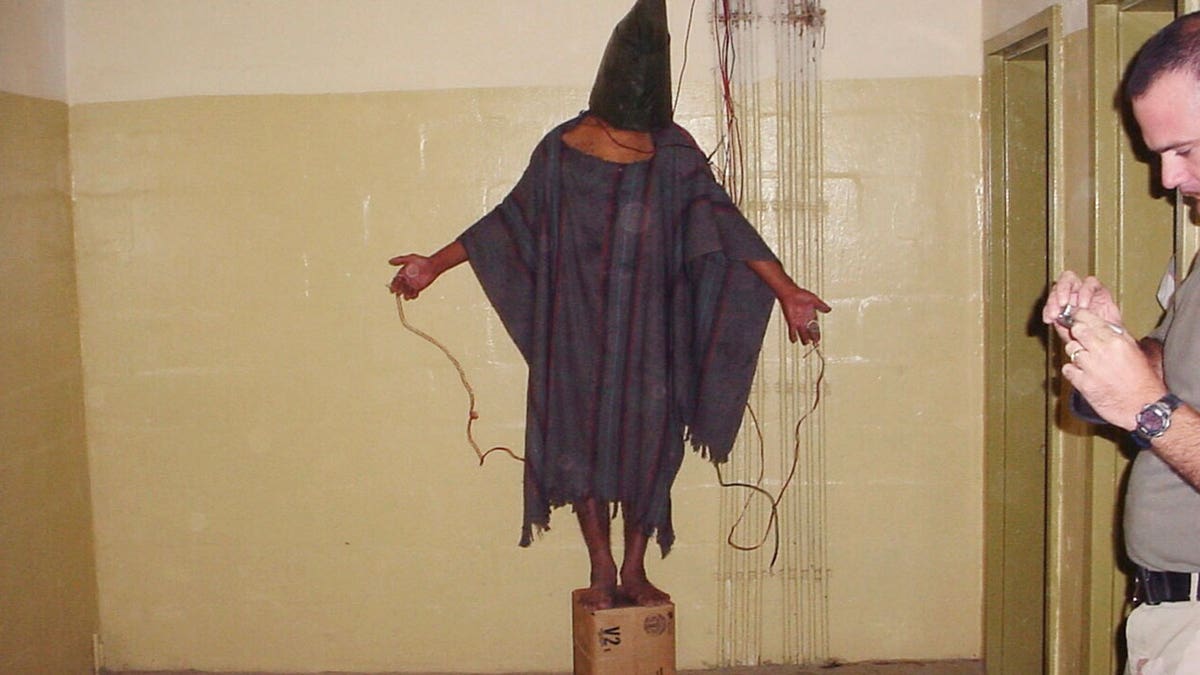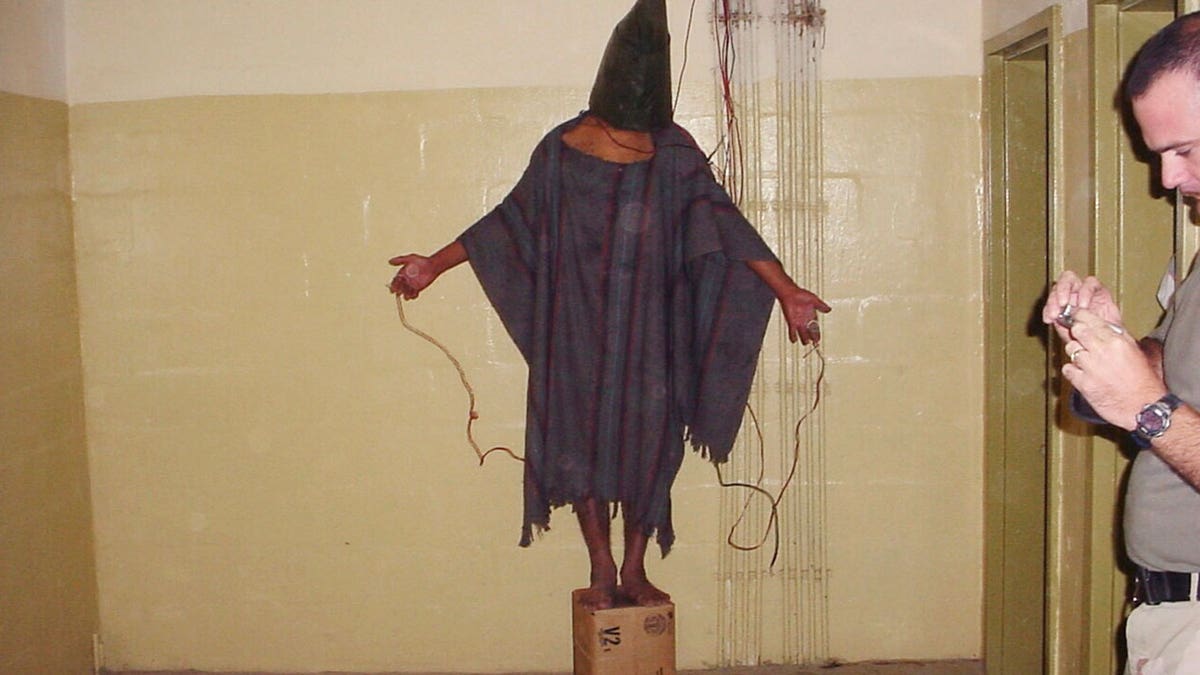- Detainees from Abu Ghraib prison in Iraq who allege abuse will testify in front of a U.S. jury for the first time in a lawsuit against Virginia-based military contractor CACI.
- CACI’s lawyers questioned whether the plaintiffs can prove they were abused, or that CACI interrogators inflicted abuse on them. Regardless, lawyers claimed the U.S. military, not the company, oversaw the interrogators’ conduct.
- After being delayed for more than 15 years, the trial is now moving very quickly.
A former detainee at the infamous Abu Ghraib prison described to jurors Monday the type of abuse that is reminiscent of the scandal that erupted there 20 years ago: beatings, being stripped naked and threatened with dogs, stress positions meant to induce exhaustion and pain.
The testimony from Salah Al-Ejaili, a former Al-Jazeera journalist who spent more than a month at Abu Ghraib in 2003, marks the first time that survivors of the U.S. prison in Iraq have been able to bring their claims of torture to a U.S. jury.
Al-Ejaili and two other Abu Ghraib detainees are suing Virginia-based military contractor CACI, accusing the company of contributing to their torture by sending over civilian interrogators as part of an Army contract. The suit cites evidence in government investigations that CACI contractors encouraged military police to “soften up” detainees ahead of their interrogations.
HOW AN IRAQ WAR VETERAN COPED WITH PTSD BY USING TASTE MINDFULNESS AND BOURBON
CACI’s lawyer, John O’Connor, acknowledged that some Abu Ghraib detainees suffered horrific abuse, but offered a three-pronged defense for the company in his opening statement to the jury.
First, he questioned whether the three detainees who filed the lawsuit can actually prove they themselves were abused. They are not pictured in the widely circulated photographs that leaked in 2004 when news of the abuse broke and shocked the world. He told the jury that official records show no formal interrogations of Al-Ejaili, for instance, even though he testified that he was interrogated many times, and frequently beaten at the outset of each interrogation.
The jury received a written declaration from the U.S. government confirming that no formal interrogation records exist, but that declaration also vaguely said that “other information” exists that might show a CACI interrogator questioned Al-Ejaili at one point.

This late 2003 photo shows an unidentified detainee standing on a box with a bag on his head and wires attached to him in the Abu Ghraib prison in Baghdad, Iraq. A trial scheduled to begin on April 15, 2024, will be the first time that survivors of Iraq’s Abu Ghraib prison will bring their claims of torture to a U.S. jury. (AP Photo, File)
CACI’s lawyer also said that even if the three plaintiffs were abused, there’s no evidence that CACI interrogators inflicted abuse on them. He said the soldiers seen smiling in photos next to naked, abused detainees were the ones who inflicted the abuse, and they were rightly convicted of crimes in military trials long ago.
“They were MPs who were sadistic, who did it on their own, and without any encouragement,” O’Connor said, of the range in military police.
Lastly, he said that even if CACI employees engaged in wrongdoing, it was the U.S. military, not the company, that oversaw the interrogators’ conduct. He rejected the notion that CACI civilians decided on their own to abuse detainees.
“The Army is pretty jealous about who has control of operations in a war zone,” he argued.
The plaintiffs’ lawyer, Baher Azmy, said it’s irrelevant whether CACI interrogators directly inflicted abuse on his clients. The company is liable, he said, because CACI interrogators conspired with military police by urging them to abuse detainees before questioning.
He said the jury will hear from two Army generals, Maj. Gen. Antonio Taguba and Maj. Gen. George Fay, who concluded from an investigation that there was a void in the chain of command that was filled by civilians. Taguba’s report concluded that at least one CACI interrogator should be held accountable for instructing military police to set up conditions that amounted to physical abuse.
“This case is about one of the most disturbing and shameful events in recent American history,” Azmy said at the outset of his opening statement.
The trial at U.S. District Court in Alexandria, which was delayed for more than 15 years amid legal wrangling and multiple appeals, is now moving at a breakneck pace. On Monday alone, a jury was seated, opening arguments were heard, and three key witnesses testified, including Al-Ejaili; a former CACI interrogator, Torin Nelson, who testified about his concerns about the actions of some of his colleagues; and former Army Cpl. Charles Graner, one of the military police who was tried and convicted in courts-martial for abusing detainees.
Nelson testified that the other interrogators lacked experience, and he was dismayed when he saw unprofessional comments on their reports, like an interrogator who noted in one report that a detainee “is crying like a little baby in the corner.”
On cross-examination, he said that he had not witnessed physical abuse by any CACI interrogator.
“I had concerns but I wasn’t witnessing anything with my own eyes,” Nelson said.
Graner’s testimony came in the form of a recorded 2013 video deposition that was played to the jury in which he said civilian interrogators gave him instructions on how to handle detainees, and told him he was doing a good job.
Al-Ejaili’s testimony was emotional and he choked up several times as he described the abuse. He recalled that he was naked in a cold cell and asked a female soldier if he could have something to wear. She returned with red women’s underwear.
CLICK HERE TO GET THE FOX NEWS APP
On another occasion, investigators handcuffed his hands to a pipe while his feet dangled. He told the jury, through an Arabic interpreter, that it felt “as if your shoulders are being pulled from their place.”
He said being able to tell his story now to a jury, even 20 years later, was important to him.
“It’s a big opportunity to tell people my story,” he said. “Perhaps it’s like a form of treatment or a remedy.”










